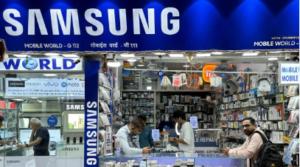Shares of Samsung Electronics experienced a sharp decline of over 3% on Friday as the strike at its southern Indian plant continued into its fifth day. The industrial action has caused significant disruption in the production of consumer electronics at one of the company’s key facilities.
Strike Details and Impact
Since Monday, hundreds of workers at Samsung’s Chennai plant have been on strike, demanding recognition of their union, wage increases, and reduced working hours. This labor unrest has become one of the largest strikes in recent years in India, impacting Samsung’s ability to produce electronic appliances such as televisions, refrigerators, and washing machines.
The Chennai facility is crucial for Samsung, accounting for up to 30% of the company’s $12 billion annual revenue from India. The ongoing disruption at this plant highlights the critical role of this facility in Samsung’s global supply chain.

Negotiation Breakdown
Efforts to resolve the strike have so far been unsuccessful. Discussions between Samsung’s management, union representatives, and state labor officials broke down on Thursday. Union leader E. Muthukumar stated that workers will continue to strike until their demands for better wages and working conditions are met. Muthukumar criticized Samsung’s management for refusing to engage in meaningful negotiations.
Broader Context
The strike at Samsung’s Indian plant comes on the heels of recent wage protests in South Korea. In July and August, 36,500 members of Samsung’s largest workers’ union went on strike, seeking higher wages and improved benefits. The ongoing labor disputes have contributed to a 6% drop in Samsung’s shares on the South Korean stock exchange this week.
Company Response
A Samsung spokesperson has assured that the company is actively addressing the workers’ grievances and is committed to complying with all applicable laws and regulations. The company has also emphasized that they are taking steps to minimize any potential disruption to consumers.
As Samsung continues to navigate these labor disputes, investors and industry observers will be closely watching how the situation evolves and its potential impact on the company’s financial performance.

Economic Impact
Revenue Contribution: The Chennai plant’s contribution of up to 30% of Samsung’s $12 billion annual revenue in India underscores its importance. This economic impact highlights the scale of potential financial losses for Samsung due to the ongoing strike.
Major Appliances Sector: The broader major appliances sector in India is valued at $38.2 billion, according to Statista. Samsung’s significant market share in this sector amplifies the importance of resolving the strike to maintain market stability.
Worker Demographics
Strike Participation: Approximately 85% of the 1,700 workers at the Chennai plant are participating in the strike, demonstrating widespread discontent among the workforce.
Union Membership: The union leading the strike represents a significant portion of the plant’s workforce, suggesting that their demands reflect broader concerns among employees.

Previous Labor Actions
South Korean Protests: The July and August strikes in South Korea involved 36,500 workers from Samsung’s largest union, highlighting a pattern of labor unrest within the company. These strikes were driven by demands for higher wages and better benefits, reflecting similar issues as those seen in India.
Company’s Financial Performance
Stock Market Trends: Samsung’s shares listed on South Korea’s stock exchange have dropped over 6% this week, reflecting investor concerns about the impact of labor disputes on the company’s performance.
Historical Context: Analyzing historical stock trends during past labor disputes could provide insights into potential long-term impacts on Samsung’s market value.
Global Operations
Other Facilities: Samsung operates multiple facilities globally, with varying degrees of labor unrest in different regions. Comparing the Chennai strike with labor issues in other countries can provide a broader perspective on Samsung’s labor relations strategy.
Legal and Regulatory Context
Compliance with Laws: Samsung’s adherence to labor laws and regulations in India and South Korea is critical. Understanding the legal framework governing labor disputes in these regions can shed light on the company’s obligations and potential legal challenges.






